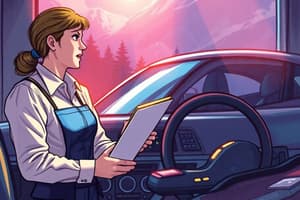Podcast
Questions and Answers
What is the purpose of building rapport with customers?
What is the purpose of building rapport with customers?
The purpose of building rapport with customers is to tailor make their experience and ensure an exceptional experience, leading to increased trust and stronger customer relationships.
Why is rapport important in sales?
Why is rapport important in sales?
Rapport is important in sales because it helps in closing more jobs, earning higher bonuses, receiving more tips, and creating more opportunities.
How can you identify the type of customer you are dealing with?
How can you identify the type of customer you are dealing with?
You can identify the type of customer by understanding if they are a Director, Socializer, Relator, or Thinker, and this will shape your pitch.
What is the benefit of asking open-ended questions?
What is the benefit of asking open-ended questions?
What is the importance of genuine interest in serving customers?
What is the importance of genuine interest in serving customers?
Why is it important to understand that every customer is different?
Why is it important to understand that every customer is different?
Define an open-ended question and explain why it requires more thought than a closed-ended question.
Define an open-ended question and explain why it requires more thought than a closed-ended question.
What is the purpose of asking open-ended questions?
What is the purpose of asking open-ended questions?
Define a closed-ended question and explain why it may lead to a conversation stop.
Define a closed-ended question and explain why it may lead to a conversation stop.
Provide an example of a closed-ended question.
Provide an example of a closed-ended question.
Provide an example of an open-ended question.
Provide an example of an open-ended question.
Why is it important to ask open-ended questions when interacting with customers?
Why is it important to ask open-ended questions when interacting with customers?
What is the potential disadvantage of asking closed-ended questions?
What is the potential disadvantage of asking closed-ended questions?
How can open-ended questions be beneficial for businesses?
How can open-ended questions be beneficial for businesses?
What are the four types of customers discussed in the text?
What are the four types of customers discussed in the text?
What are the characteristics of a Relator customer?
What are the characteristics of a Relator customer?
What are the Do's and Don'ts when dealing with a Relator customer?
What are the Do's and Don'ts when dealing with a Relator customer?
What are the characteristics of a Socializer customer?
What are the characteristics of a Socializer customer?
What are the Do's and Don'ts when dealing with a Socializer customer?
What are the Do's and Don'ts when dealing with a Socializer customer?
What are the characteristics of a Thinker customer?
What are the characteristics of a Thinker customer?
What are the Do's and Don'ts when dealing with a Thinker customer?
What are the Do's and Don'ts when dealing with a Thinker customer?
What are the characteristics of a Director customer?
What are the characteristics of a Director customer?
What are the Do's and Don'ts when dealing with a Director customer?
What are the Do's and Don'ts when dealing with a Director customer?
Flashcards are hidden until you start studying




